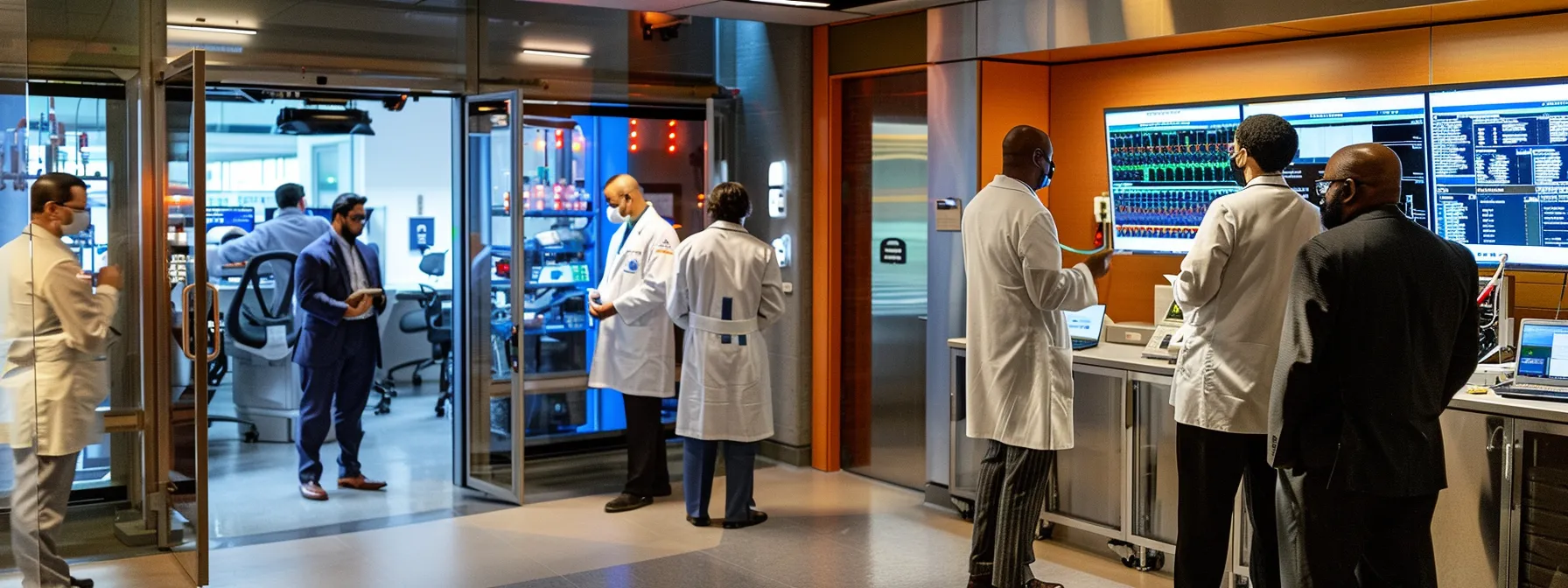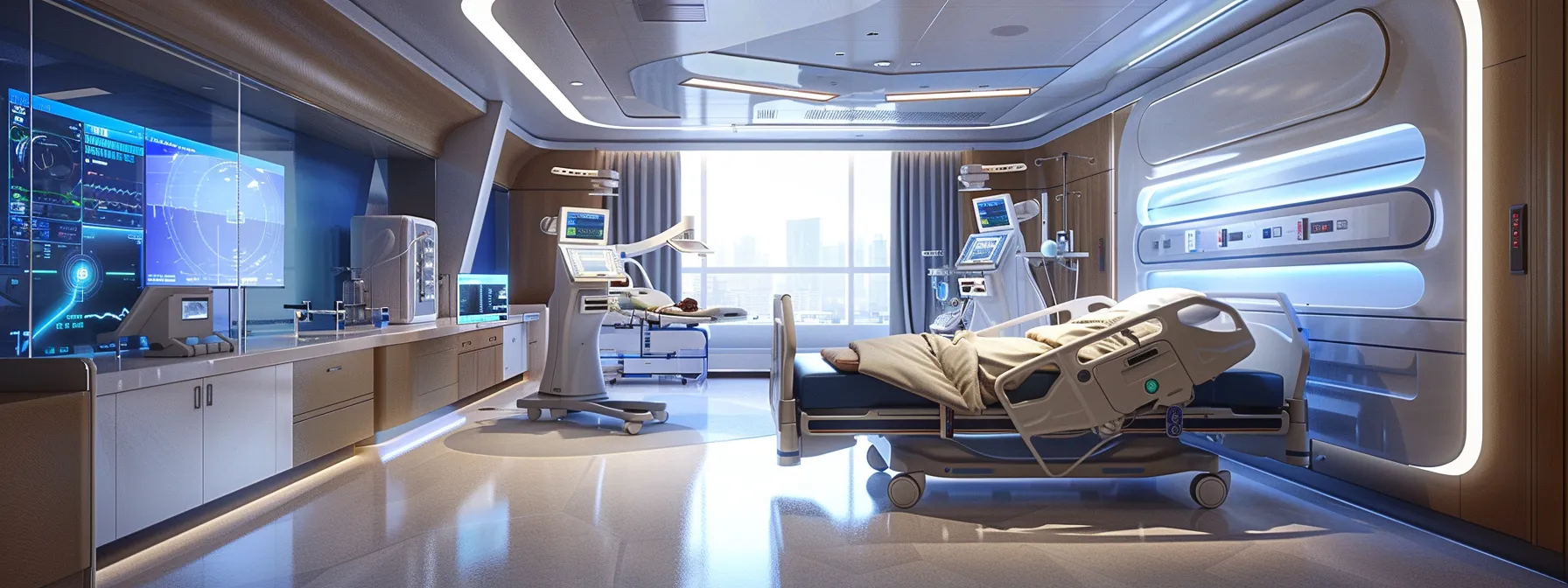Disclaimer: We sometimes use affiliate links in our content. For more information, visit our Disclaimer Page.
In today’s rapidly evolving world, healthcare innovation is crucial for improving patient outcomes and addressing community needs. Did you know that African Americans face unique challenges within emergency medicine? This blog post will explore how pioneers at institutions like Provident Hospital and the Pioneer Health Care Clinic are driving advancements in medical research to create solutions tailored to these populations. Readers will gain insights into cutting-edge technologies, collaborative efforts, and emerging trends that are shaping the future of healthcare, all aimed at overcoming the barriers faced by underserved communities.
Key Takeaways
- Innovators in healthcare are transforming medicine through research, technology, and patient-centered approaches
- Collaboration between leaders in different fields enhances the effectiveness of medical treatments and technologies
- Personalized medicine, including genomics, is improving patient outcomes through tailored treatment plans
- Addressing ethical considerations is crucial for the responsible advancement of healthcare innovations
- Mentorship and diversity in healthcare research foster innovation and better health solutions for all populations
Innovators Shaping Modern Healthcare

Innovators in healthcare significantly influence the future of medicine today. Leaders driving biomedical breakthroughs engage in intensive research, paving the way for new disease treatments. Trailblazers in medical technology develop cutting-edge tools that enhance diagnostics and patient care. Furthermore, changing paradigms in patient care delivery reshape residency programs and medical school curricula, emphasizing a more holistic approach to healthcare.
Leaders Driving Biomedical Breakthroughs
Leaders driving biomedical breakthroughs play a crucial role in transforming healthcare practices, particularly in surgical techniques and procedures. Their contributions, such as those made by trailblazers like Gerty Cori, have paved the way for innovative treatments in various clinics and hospitals. By focusing on research and development, these pioneers in healthcare are not only advancing surgical practices but also improving patient outcomes and overall healthcare delivery.
Moreover, the emphasis on collaboration between researchers and clinical practitioners is vital for fostering new ideas that lead to effective treatments. Organizations like Pioneer Memorial Hospital actively seek dedicated individuals for roles that contribute to these advancements, reflecting the growing demand for skilled professionals in biomedical fields. By addressing the evolving needs of the healthcare sector, these leaders ensure that cutting-edge solutions are integrated into daily practice, ultimately enhancing patient care and safety.
Trailblazers in Medical Technology
Trailblazers in medical technology have significantly influenced the landscape of modern healthcare by introducing groundbreaking solutions that enhance patient management and outcomes. Influential figures like Elizabeth Blackwell, the first woman to earn a medical degree in the U.S., have paved the way for innovation within the field, encouraging diverse professionals to join the ranks of healthcare providers. These pioneers challenge the status quo, creating devices and systems that facilitate better surgical practices and improve the overall efficiency of care delivery.
Additionally, the contributions of professionals such as Susan La Flesche Picotte, who was the first Native American woman to earn a medical degree, highlight the intersection of innovation and public health. Their work not only advances surgical techniques but also addresses the pressing needs of underserved communities. As medical technology progresses, these pioneers remain essential in bridging gaps in healthcare access and promoting a skilled workforce prepared to tackle the challenges of modern medicine.
Changing Paradigms in Patient Care Delivery
Changing paradigms in patient care delivery emphasize a more integrated approach to treatment, where physical therapy and traditional medical practices work hand in hand. For instance, Rebecca Lee Crumpler, the first African American woman to earn a medical degree in the United States, advocated for holistic care in underserved communities, demonstrating the importance of combining various forms of therapy to improve health outcomes. This shift is vital as it allows physicians to create comprehensive treatment plans that cater to the diverse needs of patients, ultimately fostering more effective recovery paths.
The role of the Surgeon General of the United States in promoting awareness about preventive care and community health initiatives further supports this transition. By highlighting the significance of both physical therapy and surgical interventions, the Surgeon General encourages a coordinated approach to health management. As healthcare delivery evolves, the integration of therapies within patient care ensures that individuals receive well-rounded support, addressing not only immediate medical concerns but also long-term wellness strategies.
Innovators set the stage for change, but the real transformation lies in the tools they wield. Cutting-edge technologies are now the lifeblood of medicine, driving progress and reshaping how care is delivered.
Cutting-Edge Technologies Transforming Medicine

Cutting-edge technologies are revolutionizing modern medicine, focusing on improving health equity and patient outcomes. The role of artificial intelligence in healthcare enhances diagnosis and treatment efficiency. Advancements in telemedicine and remote care are expanding access for patients, while personalized treatments through genomics are providing innovative solutions for conditions like infections and joint replacement. This section explores these transformative technologies in detail.
The Role of Artificial Intelligence in Healthcare
Artificial intelligence (AI) is transforming healthcare, especially in the field of pediatrics, where precise diagnosis and treatment are paramount. AI algorithms analyze vast amounts of data, enabling healthcare providers to predict patient outcomes and improve treatment plans significantly. This innovation catches the attention of medical professionals and board of directors alike, as the potential for enhanced efficiency and accuracy in patient care continues to grow.
One notable example of AI’s impact is seen through the work of figures like Antonia Novello, who has advocated for advanced technologies to address public health challenges. In the pediatric sector, AI-powered tools enhance the management of chronic conditions, leading to better health outcomes for children. By streamlining workflows and providing actionable insights, AI stands as a crucial ally for healthcare teams navigating complex medical landscapes.
Advancements in Telemedicine and Remote Care
Advancements in telemedicine and remote care are reshaping the healthcare industry by making services more accessible to patients. Innovative technologies, such as patient portals, allow individuals to interact with healthcare providers from the comfort of their homes, which is especially beneficial for those who may find it challenging to visit medical facilities in person. The National Medical Association supports these developments, recognizing their potential to enhance care delivery and improve patient satisfaction.
Furthermore, scientists are actively researching ways to expand telehealth services, particularly for populations utilizing Medicare. With telemedicine, patients can receive continuous monitoring for chronic conditions without the inconvenience of frequent office visits. This approach not only improves patient outcomes but also reduces healthcare costs, making it a valuable option in today’s evolving medical landscape.
Personalized Treatments Through Genomics
Personalized treatments through genomics are reshaping the healthcare landscape by enabling tailored therapies based on individual genetic profiles. For instance, advancements in pathology allow healthcare providers to analyze blood samples for genetic markers that indicate a patient’s susceptibility to certain neurological conditions. By understanding these genetic variations, medical professionals can create personalized treatment plans that target specific disorders, improving outcomes and fostering more effective interventions.
Pioneers such as James McCune Smith emphasized the importance of individualized care, advocating for approaches that consider human diversity in medical treatment. Today, genomics plays a critical role in this vision, offering insights that can lead to breakthroughs in managing diseases. By integrating genomic data into treatment protocols, healthcare systems can address specific patient needs, ultimately enhancing the quality of care and bridging the gaps in medical disparities.
New technologies are changing medicine in ways once thought impossible. Yet, each advancement comes with its own set of hurdles that must be addressed for progress to continue.
Overcoming Challenges in Medical Innovation

Addressing challenges in medical innovation involves navigating regulatory landscapes, managing ethical considerations, and securing funding for research and development. Howard University Hospital plays a pivotal role in acute care, especially in wound treatment, where famous leaders in medicine advocate for continuous advancements. Understanding these factors is essential for driving effective healthcare solutions and improving patient outcomes.
Navigating regulatory landscapes is a critical issue for innovators in healthcare seeking to bring new technologies and treatments to market. Regulations can vary significantly among regions, which may pose challenges for compliance as healthcare solutions are developed. For instance, understanding the guidelines set forth by the FDA is essential for medical technology companies aiming to ensure their products meet safety and efficacy standards. This awareness can facilitate faster approvals and allow innovators to introduce their advancements more effectively to patients in need.
Moreover, forming strategic partnerships with regulatory experts can help healthcare pioneers streamline the approval process, ensuring that they remain compliant while promoting innovation. Engaging with regulatory bodies early in the development stages can provide guidance on necessary documentation and testing protocols, ultimately reducing time-to-market for groundbreaking treatments. By addressing regulatory challenges proactively, leaders in healthcare contribute to making innovative solutions available more swiftly, thus enhancing patient care and outcomes.
Addressing Ethical Considerations
Addressing ethical considerations is fundamental in advancing medical innovation. Innovators in healthcare must navigate complex dilemmas surrounding patient consent, data privacy, and the equitable distribution of new technologies. For example, when developing artificial intelligence tools for diagnosis, ensuring that these systems do not perpetuate biases or compromise patient confidentiality becomes essential. Ethical frameworks guide researchers and developers in prioritizing patient rights while seeking improvements in healthcare delivery.
Furthermore, engaging stakeholders—including patients, healthcare providers, and ethicists—in the development process can enhance the ethical integrity of medical innovations. Through community consultations and transparent communication, innovators can gain valuable insights that help address concerns and promote trust. By fostering an ethical approach to healthcare innovation, organizations not only comply with regulations but also enhance the overall quality of care and patient satisfaction.
Securing Funding for Research and Development
Securing funding for research and development is a critical challenge for healthcare innovators. Many organizations rely on a mix of government grants, private investments, and partnerships with pharmaceutical companies to finance groundbreaking projects. For example, institutions like Johns Hopkins University actively seek funding to advance their research in medical technologies, showcasing how collaboration can significantly enhance resource availability.
Effective grant writing and building strong relationships with investors can greatly increase the chances of obtaining necessary funding. Innovators need to clearly articulate the potential impact of their work on patient outcomes and the broader healthcare system. By addressing specific healthcare needs and demonstrating a viable path for their innovations, they can attract the attention and support required to transform ideas into successful medical solutions.
Yet, amid the struggles, the spirit of teamwork thrived. Together, they forged paths forward, revealing how collaboration can accelerate true progress in medical innovation.
Collaborative Efforts Accelerating Progress

Partnerships between academia and industry play a vital role in driving healthcare innovations, allowing researchers to translate findings into practical applications. Government initiatives supporting innovation further bolster these efforts by providing essential resources and guidance. Additionally, global collaborations improve health outcomes by sharing knowledge and best practices across borders, enhancing the effectiveness of healthcare systems worldwide.
Partnerships Between Academia and Industry
Partnerships between academia and industry play a crucial role in advancing modern medicine. These collaborations foster an environment where cutting-edge research can transition into practical healthcare solutions. For example, universities often partner with biotech companies to develop new medical devices or innovative therapies, ensuring that the latest scientific discoveries benefit patients directly.
By pooling resources and expertise, these partnerships accelerate the development of new treatments and technologies. Academic institutions bring in-depth research knowledge, while industry partners contribute practical insights and funding. Together, they address key healthcare challenges effectively, leading to improved health outcomes for diverse populations:
- Enhancement of research methodologies and clinical trials.
- Fostering innovation in medical technology and treatments.
- Streamlining the path from laboratory discoveries to market-ready solutions.
Government Initiatives Supporting Innovation
Government initiatives play a critical role in fostering healthcare innovation by providing financial resources and regulatory support for new technologies. Programs such as the Small Business Innovation Research (SBIR) grant encourage startups to develop groundbreaking medical solutions by offering funding for research and development. By backing innovative projects, these government efforts help bridge the gap between scientific research and practical applications in healthcare.
Additionally, government agencies like the National Institutes of Health (NIH) actively promote public-private partnerships to drive medical advancements. These collaborations enable researchers and industry leaders to work together, sharing knowledge and expertise to accelerate the development of new treatments and devices. Such initiatives ensure that the advancements in modern medicine address the evolving needs of healthcare systems and improve patient outcomes:
Global Collaborations Improving Health Outcomes
Global collaborations are increasingly essential in improving health outcomes worldwide. Initiatives like the Global Fund to Fight AIDS, Tuberculosis, and Malaria illustrate how international partnerships can mobilize resources and expertise to address pressing health challenges. By pooling knowledge and funding, countries can implement effective strategies that combat these diseases, ultimately reducing their impact on vulnerable populations.
Moreover, organizations such as Médecins Sans Frontières (Doctors Without Borders) exemplify how cooperative efforts can deliver healthcare in crisis situations. By deploying teams of medical professionals across the globe, they address immediate health needs while also promoting medical education and infrastructure development in underserved regions. These collaborations not only enhance access to quality care but also focus on sustainable health improvements by empowering local communities:
- Collaboration between global health organizations and local governments fosters sustainable solutions.
- Shared knowledge enables targeted responses to specific regional health challenges.
- Cooperative funding helps to prioritize healthcare initiatives that have the most significant impact.
The work of many hands fuels a new dawn in health. As these efforts grow, fresh trends emerge, beckoning a brighter future for healthcare.
Emerging Trends Shaping the Future of Healthcare

Emerging trends in healthcare signify a transformative phase that focuses on anticipation of breakthroughs on the horizon and the integration of technology for better patient care. These advancements pave the way for preparing the next generation of innovations, ensuring healthcare remains responsive to evolving patient needs. Each section explores these critical areas, highlighting their potential impact on modern medicine.
Breakthroughs on the Horizon
Future breakthroughs in healthcare are expected to come from advancements in biotechnology and data analytics. These innovations aim to personalize treatment plans based on genetic information, allowing healthcare professionals to tailor therapies that are more effective for individual patients. For instance, CRISPR technology is at the forefront of gene editing, promising to correct genetic disorders at the source and leading to improved patient outcomes.
Additionally, wearable technology continues to evolve, offering real-time health monitoring and data collection. Devices that track vital signs not only empower patients to take charge of their health but also provide healthcare providers with critical insights into patients’ conditions. By integrating these technologies into everyday practice, pioneers in healthcare are making strides toward a system where preventive care becomes the norm, significantly improving overall well-being.
Integrating Technology for Better Care
Integrating technology into healthcare significantly enhances patient care and outcomes. Innovations such as electronic health records (EHRs) streamline the documentation process, enabling providers to access comprehensive patient histories quickly. This accessibility improves communication among healthcare teams, facilitating coordinated care that is crucial for managing chronic illnesses and complex cases.
Additionally, telemedicine has emerged as a vital tool, allowing patients to receive care remotely. This technology addresses barriers like distance or mobility issues, ensuring that patients can consult with healthcare professionals without the need for in-person visits. By embracing these technologies, healthcare providers not only improve the patient experience but also promote greater health equity across diverse populations.
Preparing for the Next Generation of Innovations
Pioneers in healthcare are increasingly focusing on integrating technology into medical education to prepare the next generation of innovators. Training programs are incorporating digital tools and data analytics, ensuring that future healthcare professionals are equipped with the skills necessary to navigate rapid advancements in medicine. This proactive approach addresses the emerging needs of patients and healthcare systems, emphasizing the importance of adaptability in clinical practices.
Furthermore, collaborative initiatives among universities, research institutions, and healthcare organizations are essential for fostering innovation. By combining academic research with practical applications, these partnerships enable the development of cutting-edge technologies that enhance patient care. As healthcare evolves, embracing interdisciplinary collaboration will be crucial in addressing the complexities of modern medicine and improving health outcomes for diverse populations.
The new trends in healthcare bring hope and change. As these shifts unfold, a fresh generation of pioneers prepares to lead the way.
Inspiring the Next Wave of Healthcare Pioneers

Cultivating innovation through education plays a crucial role in shaping the next generation of healthcare pioneers. Encouraging diversity in medical research ensures a broad range of perspectives that can lead to more effective solutions. Additionally, mentorship and leadership are essential in guiding emerging professionals toward impactful careers in healthcare. Each of these factors contributes significantly to advancing modern medicine and enhancing patient outcomes.
Cultivating Innovation Through Education
Cultivating innovation through education is essential for developing the next generation of healthcare pioneers. By incorporating hands-on training and interdisciplinary approaches in medical curricula, educational institutions can equip students with the skills necessary to address current healthcare challenges. Programs that emphasize collaboration and problem-solving not only foster creativity but also encourage students to explore new technologies and methodologies in patient care.
Moreover, mentorship programs linking experienced professionals with students help bridge the gap between theoretical knowledge and practical application. These relationships allow emerging healthcare innovators to gain insights into real-world challenges and solutions, enhancing their educational experience. As the healthcare landscape evolves, fostering a culture of continuous learning and adaptation is critical for ensuring that future pioneers are prepared to advance modern medicine effectively.
Encouraging Diversity in Medical Research
Encouraging diversity in medical research is crucial for fostering innovation and ensuring that healthcare solutions meet the needs of all populations. A diverse research workforce brings varying perspectives, promoting the development of treatments that are effective across different demographics. For example, clinical trials that include participants of various races and ethnicities can lead to more accurate data on how specific treatments work in diverse populations, ultimately advancing the quality of care for everyone.
To further this initiative, institutions must actively recruit individuals from underrepresented communities into research roles. Providing scholarships, mentorships, and internship opportunities can help bridge the gap and inspire a new generation of healthcare pioneers. These actions not only support diversity but also address health disparities by ensuring that research focuses on the unique challenges faced by various groups, leading to more comprehensive healthcare solutions:
- Promote recruitment of diverse candidates into medical research programs.
- Provide mentorship and support structures for underrepresented students.
- Encourage collaboration between diverse groups to tackle unique health challenges.
Mentorship and Leadership in Advancing Healthcare
Mentorship is a cornerstone of developing future leaders in healthcare, offering guidance and support that foster professional growth. Established healthcare professionals share invaluable knowledge and experiences with emerging talent, helping them navigate the complexities of the medical field. These mentorship relationships can help new practitioners build confidence, improve their skills, and adapt to innovations in medicine.
Effective leadership within healthcare organizations promotes a culture of collaboration and improvement, crucial for advancing modern medicine. By fostering an environment where mentorship thrives, healthcare leaders empower teams to explore innovative solutions to patient care challenges. This approach not only enriches the professional experience for new practitioners but also enhances overall healthcare delivery, as diverse ideas contribute to better outcomes.
Conclusion
Pioneers in healthcare are crucial for advancing modern medicine through their relentless pursuit of innovation. Their impactful contributions drive improvements in treatment methods, medical technology, and patient care delivery, ultimately enhancing health outcomes for diverse populations. By fostering collaboration across various sectors and prioritizing ethical considerations, these leaders ensure that healthcare remains adaptable and effective. Recognizing the significance of their work inspires future generations to continue pushing the boundaries of what is possible in medicine.





